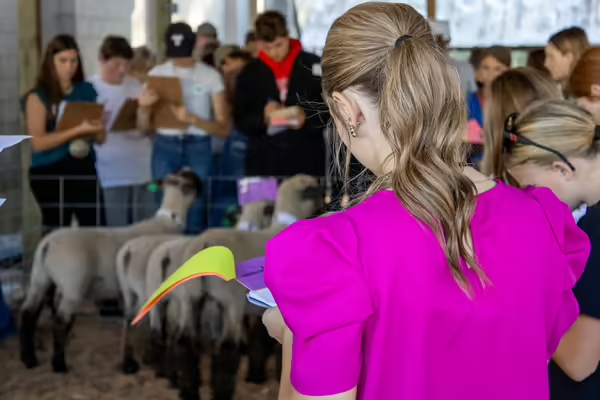
The 4-H Livestock Judging Contest brought together youth from across Illinois and Indiana to test their livestock evaluation skills while fostering teamwork, confidence, and agricultural awareness. Illinois Extension and 4-H serving Clark, Crawford, and Edgar counties provided a livestock judging contest for over 230 youth from more than 25 schools in Illinois and Indiana. Lendzy Stewart, Crawford County 4-H Leader and Livestock Judging Coach, led the charge in bringing this event from dream to reality. She secured eight classes of livestock, including beef, swine, sheep, and goats. All of which were provided by Illinois farm families.
Members of the Lake Land College Livestock Judging Team were officials for the day. These college students were excellent role models of agriculture-based college paths for the junior high and high school students in attendance. While youth waited for the results, they enjoyed locally-sourced pork burgers generously sponsored by the Illinois Pork Producers Association and Crawford County Extension Foundation.
At the end of the day, banners were won, bellies were full, but our hearts were even more full from the smiles of youths ages 8 to 18 who followed their passion. From spirited competition to sizzling pork burgers, the 4-H Livestock Judging Contest proved that learning about livestock can be both educational and fun.
University of Illinois Extension develops educational programs, extends knowledge, and builds partnerships to support people, communities, and their environments as part of the state's land-grant institution. Extension serves as the leading public outreach effort for University of Illinois Urbana-Champaign and the College of Agricultural, Consumer and Environmental Sciences in all 102 Illinois counties through a network of 27 multi-county units and over 700 staff statewide. Extension’s mission is responsive to eight strategic priorities — community, economy, environment, food and agriculture, health, partnerships, technology and discovery, and workforce excellence — that are served through six program areas — 4-H youth development, agriculture and agribusiness, community and economic development, family and consumer science, integrated health disparities, and natural resources, environment, and energy.